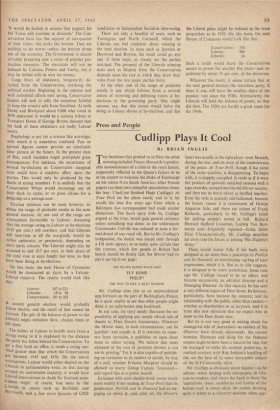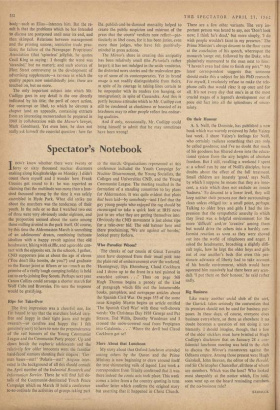Press and People
Cudlipp Plays It Cool
By BRIAN INGLIS THE headlines that greeted us in Nice the other morning included France Dimanche's predict- able announcement of a crisis in the royal family, supposedly reflected in the Queen's failure to be at the airport to welcome the Duke of Edinburgh on his return from South America; other French papers ran their own colourful speculations about the tour. I had just finished Hugh Cudlipp's At Your Peril on the plane south; and in it, he recalls the tour five years ago from which a Baltimore Sun correspondent had made similar deductions. The Sun's spicy little lie, Cudlipp argued at the time, would gain general currency unless something was done; so the unfortunate Commander Colville was induced to issue a for- mal denial of any royal rift. But to Mr. Cudlipp's indignation, the denial was issued only through a US news agency; so to make quite certain that the rumour, which few people in Britain had beard, should be finally laid, the Mirror had to put it on the front page:
THE PALACE DENIES ROYAL RIFT
FLY HOME PHILIP!
THE WAY TO KILL A SILLY RUMOUR
Mr. Cudlipp cites this as an unprecedented step forward on the part of Buckingham Palace; he is quite unable to see that other people might think it an unfortunate step backward.
In any case, the story neatly illustrates the im- possibility of applying any simple ethical rule of thumb to Fleet Street's transactions. Whatever the Mirror does, in such circumstances, can be justified—and usually is. If it restrains its repor- ters from intrusion, it publishes an open letter from its editor saying, 'We believe that news obtained at the cost of personal distress is not worth printing.' Yet it is also capable of publish- ing an invitation to its readers to decide, by way of a poll, whether Princess Margaret should be allowed to marry Group Captain Townsend— and regard this as a public benefit.
Irritation with such double-think comes much more readily from reading At Your Peril than its predecessor. Publish and be Damned had an en- gaging air about it; and, after all, the Mirror's heart was usually in the right place—over Munich, during the war, and on most of the controversies of the peace. At Your Peril, though it has some of the same qualities, is disappointing. To begin with, it is sloppily compiled. It reads as if it were the product of sporadic snatched sessions with a tape-recorder, vamped into the old Mirror manner, and then not so much edited as shuffled together. Even the style is quaintly old-fashioned; beneath the breezy veneer it is reminiscent of George Augustus Sala; and there are echoes of Frank Richards, particularly in Mr. Cudlipp's relish for putting people's names in full: Richard Howard Stafford Crossman, Ludwig Van Beet- hoven and—frequently repeated—Julius Salter Elias. Characteristically, Mr. Cudlipp describes his entry into the forces as joining 'His Majesty's Army.'
These would matter little if the book were designed as no more than a postscript to Publish and be Damned; an entertaining rag-bag of later impressions, which it is. But as its title suggests, it is designed to be more pretentious. Some time ago Mr. Cudlipp ceased to be an editor, and became successively an editorial director and a Managing Director. In that capacity he has seen a very different aspect of Fleet Street. Its finances, particularly, have become his concern; and its relationship with the public, other than readers— whether as shareholders or as jurymen. And it is from this new elevation that we expect him to show us the Fleet Street view.
But he is not very good at writing about the managerial side of journalism—as readers of the Observer have already discovered: the contest between Thomson and King for the Odhams empire ought to have been a natural for him, but he managed to make his account pedestrian, in marked contrast with Roy Jenkins's handling of the, on the face of it, more intractable subject of the ICI /Courtaulds affair.
Mr. Cudlipp is obviously much happier—as he admits—when dealing with newspapers in rela- tion to readers; and where the book is about the 'aspirations, tastes, snobberies and foibles of the human race' it comes alive, the author showing quite a talent as a character-sketcher when any- body—such as Elias—interests him. But the re- sult is that the, problems which he has intended to discuss are postponed until near its end, and• then skimped. Relations between management and the printing unions; restrictive trade, prac- tices; the failure of the Newspaper Proprietors' Association (that 'spineless' jellyfish, he quotes Cecil King as saying: I thought the word was 'stranded,' but no matter); and such sources of Fleet Street controversy as the development of advertising supplements—a rat-race in which the quality papers now uninhibitedly join; these are touched on, but no more.
The only important subject into which Mr. Cudlipp goes in any detail is the one directly indicated by his title; the peril of court action, for contempt or libel, to which he devotes a chapter (and an appendix, containing extracts from an interesting memorandum he prepared in 1960 in collaboration with the Mirror's lawyer, Mark Goodman). Yet even here, be does not really ask himself the essential question : how far the publish-and-be-damned mentality helped to create the public suspicion and mistrust of the press that the courts' verdicts now reflect—par- ticularly in libel cases, for it has been juries, even more than judges, who have felt punitively- minded in press actions.
The Mirror's share in creating this antipathy has been relatively small (the Pictorial's rather larger); it has not indulged in the snide vendettas, the distorted news stories and the malevolent gos- sip of some of its contemporaries. Yet its brand image is not readily distinguishable from theirs, in spite of its courage in taking lines certain to be unpopular with its readers (on hanging, or immigration); in spite of Cassandra. And this is partly because attitudes which to Mr. Cudlipp can still be condoned as cheekiness or boasted of as brashness may to other people reflect less endear- ing qualities.
And if only, occasionally, Mr. Cudlipp could bring himself to admit that he may sometimes have been wrong!















































 Previous page
Previous page